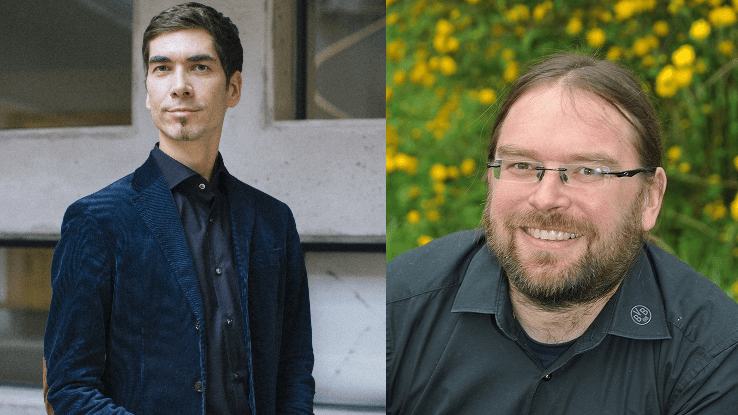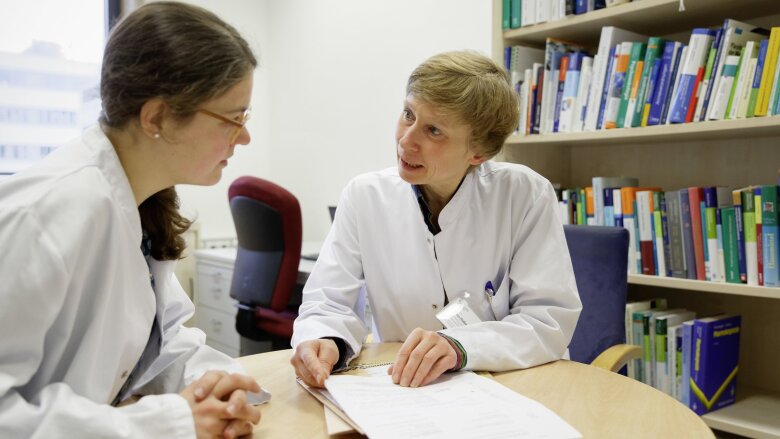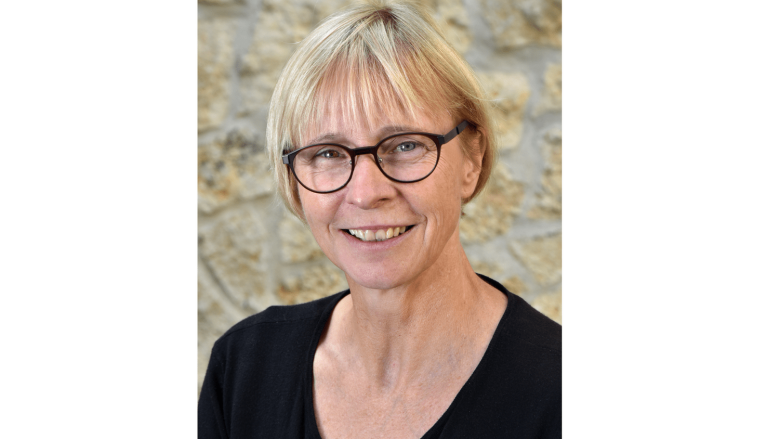
Friedrich Schiller University Jena received funding as part of the Curricula der Zukunftprogramme. In the framework of the Thuringian strategy for digitization in higher education, the Thuringian Ministry of Education, Science and Culture (TMBWK) supported innovative study content from its strategy and innovation budget. The three teaching projects funded at the University of Jena are:
-
Digital Professionalization in Teacher Training (DIKoKo)
Project leaders: Prof. Dr Alexander Gröschner and Prof. Dr Berkemeyer
Image: Anne Günther (University of Jena)Teacher training plays a central role in higher education, since well-qualified teachers play a key role in discovering and promoting young talent in the school sector. Since its modularization and reform in 2009, teacher training at the University of Jena has established itself in Thuringia and is now also known throughout Germany—especially for its early implementation of a practical semester. The aim of the project Digitale Professionalisierung im Lehramtsstudium – Individuell. Kollaborativ. Kompetenzorientiert (Digital Professionalization in Teacher Training—Individual. Collaborative. Competence-Oriented, DIKoKo) is to support the reformed accompanying study programme in educational science in the winter semester 2018/19 with a digitization strategy. The aim is to provide innovative digital teaching/learning formats designed from a perspective of higher education didactics for the evidence-based and professionally oriented study content. The core of the project is to integrate digital tools for teaching and learning into the corresponding modules in a targeted manner in order to prepare the future teachers for the changed conditions and digital challenges of everyday professional life already during their studies.
The aim of the project is to provide all students in teacher training programmes (grammar school and regular school teaching profession) with opportunities to acquire their knowledge and skills by means of blended learning and online courses in different event formats in the course of their studies—in addition to the previously exclusively classroom-based courses. The flipped classroom approach is used in particular in the introductory study phase; task processing and reflection phases (by means of an online platform) are to support the sustainable acquisition of knowledge. What makes the approach unique for a teacher training programme at a university in Germany covering all disciplines is the use of peer- and team-teaching oriented video feedback (Gröschner et al., 2018). Here, micro-teaching is used to test professional learning opportunities for teaching—in a theory-based, action-oriented way that promotes reflection on the topic of classroom communication. The experiences of the practical training come to bear in seminar forms, in which certain topics—based on interests—are deepened by means of individual and collaborative activities.
Parallel to the DIKoKo project—from January 2019—further (digitally supported) learning opportunities for teacher training and schools of the future will be offered in the newly founded ‘Learning to Teach-Lab: Science (LTL:S)’ at the Institute of Educational Science (headed by Prof. Dr Alexander Gröschner)
More information at: https://www.teach.uni-jena.de/en
Contact persons:
Prof. Dr Alexander Gröschner
Email: alexander.groeschner@uni-jena.de
Phone: +49 3641-945350Prof. Dr Nils Berkemeyer
Email: nils.berkemeyer@uni-jena.de
Phone: +49 3641-945360 -
EHealth and Communication
Project leader: Prof. Dr Jutta Hübner
Image: UKJ/SkollIncreasing networking and complexity in research and patient care requires better information flow, better data exchange, and communication that is more intensive. This happens within one's own professional group, but—crucially—with laypersons (population, patients and relatives, media). An increasing part of this exchange takes place in electronic media. In addition to high potentials, this development is also characterized by risks and barriers (inequality between generations (digital visitors vs. digital natives), (e)health literacy depending on the level of education, data protection, and ethical considerations, e.g. on Quantified Self).
Today, doctors are already faced with informed patients who have obtained a large part of their information but also of their questions from web-based offers (about which the doctor often knows little or nothing). This new development is both an opportunity and a risk. Opportunity, because patients can prepare for or follow up on the conversation with the doctor. Risk, because many web-based information offers are inadequate, poor and can sometimes even cause considerable harm with (conscious or unconscious) misinformation. In social networks, there is an increasing distrust of doctors, academic and evidence-based medicine, so that the patient-doctor relationship is strained.
Communicating research ideas and research results to laypersons (which also includes decision-makers in politics and society) will become very important for research in the future. This means that comprehensible communication about highly complex interrelationships will also be necessary under the rules of modern media.
Objectives of the project
The aim of the project is to develop an interdisciplinary Master's programme ‘eHealth’ at Friedrich Schiller University Jena for graduates of medicine, dentistry, nutritional sciences, nursing sciences or psychology and other academic professional groups active in health care. The focus of the study programme is on the integration of eHealth in information transfer and communication. This continuing education programme should also appeal to graduates from other universities and universities of applied sciences, thus becoming a model degree programme throughout Germany. The Master's programme is divided into attendance phases and phases of digital learning close to home. It can be completed while working.
Participating disciplines and experts
- Medicine and Dentistry
- Nutritional sciences
- Psychology
- Nursing and Nursing sciences
- Informatics
- Medical informatics
- Communication sciences
- Medical journalists, bloggers; manufacturers and users of eHealth offerings
- Patient representatives, especially with activities in (social) media
- Close contact with experts from the field, especially during internships and master's theses
Contact person:
Prof. Dr Jutta Hübner
Email: jutta.huebner@med.uni-jena.de
Phone: +49 3641-9324256 -
Inter-university teaching in the context of heterogeneity-sensitive teacher education
Project leader: Prof. Dr Bärbel Kracke
Image: Anne Günther (University of Jena)The aim of the cooperation project is to anchor the topic ‘Dealing with inclusion in the school context’ in a jointly developed curriculum at the two teacher training universities Friedrich Schiller University Jena and the University of Erfurt (UE).
Societal and educational policy developments require that future teachers be sensitized to heterogeneity and—in particular—inclusion, more intensively and systematically than before, and that they be prepared to deal productively and without prejudice with the associated challenges (e.g. cooperation in multiprofessional teams of regular teachers and support teachers, target-differentiated teaching) (KMK, 2015).
As part of the Qualitätsoffensive Lehrerbildung (Teacher Training Quality Campaign) programme funded by the Federal Ministry of Education and Research (BMBF), the universities of Jena and Erfurt have been working on the comprehensive field of inclusion in various formats since 2015. In the pilot project, the expertise developed here is to be systematized reciprocally and sustainably for teacher training at both locations with the help of a digital online platform, digitally processed, and further developed with regard to transferability to other study programmes.
Based on a joint curriculum derived at the beginning of the project work from the ‘Guiding principles for an inclusion-oriented, cross-phase and phase-networking teacher education in Thuringia’ (Leitgedanken für eine inklusionsorientierte, phasenübergreifende und phasenvernetzende Lehrerbildung in Thüringen, published in 2018 by the Thüringer Beirat für Inklusion), two central goals are to be pursued in the cooperation project:
- identification and digital translation of existing curricular building blocks at both universities and
- co-constructive development of a model joint event offer.
All developed elements will be made available on a Moodle-based learning platform, the ‘Glocal Campus’, to be used free of charge by both universities.
Contact person:
Prof. Dr Bärbel Kracke
Email: baerbel.kracke@uni-jena.de
Phone: +49 3641/945341


